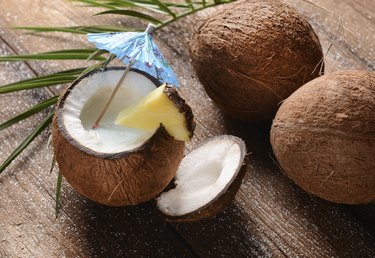Things You'll Need
Bowls
Scrap paper
Blender
Dish tub
Wooden picture frames
Screen material
Staple gun
Sponge

Making your own paper gives you control over the final color and texture. The paper can then be used in a variety of projects including card making, scrapbooking and paper art. Coconut fiber, or coir, adds further texture to the paper. Coir is a byproduct of the coconut industry. Made up of the hairlike strands located between a coconut's husk and fruit, it is dark brown and durable. When added to paper it lends a fibrous appearance and texture as well as strengthening the paper.
Step 1
Break apart the chunks of coconut coir and place it in a bowl. Add enough warm water to cover the coir and allow it to soak overnight.
Video of the Day
Step 2
Tear paper into 1-inch squares. Use construction paper, tissue paper or any other non-glossy scrap paper you have available. Place this in a separate bowl and cover with warm water. Let it soak overnight.
Step 3
Place one to two handfuls of the soaked paper into a blender. Fill the blender with warm water until it is 2/3 full. Blend until the paper resembles cooked oatmeal, then pour it into a dishpan or shallow plastic tub. Repeat the process two to three more times.
Step 4
Place a handful of the coconut fibers in the dishpan with the paper pulp and mix them together with your hands. Add more warm water if necessary until the mixture resembles a thick soup.
Step 5
Staple a piece of screening material to the back of a picture frame that has the backing and glass removed. Stretch the screen taut while stapling so there are no sagging areas. Set a second frame with the glass and backing removed on top the screened one so the screen is sandwiched between the two frames.
Step 6
Dip the frames into the pulp and fiber mixture while keeping the non-screened frames on top. Hold the frames vertical as you dip them into the mixture, then turn them horizontal once they are submerged. Quickly lift the frames from the pulp. The screen should now be coated in pulp and fibers.
Step 7
Hold the screen over the tub until it is done draining. Remove the empty frame and set aside, then turn the screened frame over onto a flat kitchen towel so the paper is now sitting on the towel with the screen on top of it.
Step 8
Soak up the excess water from the paper with a sponge. Blot the sponge against the screen, wringing out the sponge as necessary. Repeat until the paper begins separating from the screen. Slowly lift the screen frame up, leaving the paper on the towel.
Step 9
Leave the paper to dry overnight. If still damp after 24 hours, hang from a clothesline or replace the towel and let it dry completely.
Tip
Coconut coir is available at home and garden stores or in most gardening sections of hardware stores.
Add food coloring or dyes to the pulp mixture to change the paper color.
Push seeds, more coconut fibers or other decorative elements into the sheet of paper as soon as you lift the screen from the tub, if desired.
Mix a packet of gelatin in with the pulp mixture. This prevents ink from running if you plan to write on the paper.
Video of the Day